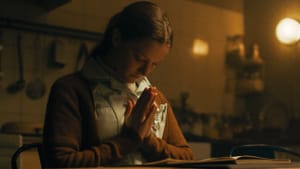Stay in the Loop
BSR publishes on a weekly schedule, with an email newsletter every Wednesday and Thursday morning. There’s no paywall, and subscribing is always free.
The horror in humanity
Rose Glass’s ‘Saint Maud’

As a lifelong fan of horror in all its forms, I have been looking forward to seeing Saint Maud—especially since it’s distributed by A24, the studio behind The Witch, Hereditary, and Midsommar, three of my favorite horror films of the past few years. All those movies have one thing in common: their horror is rooted firmly in human experience and truth, which for me is the most powerful kind of terror you can unleash upon an audience.
A perfect delay
Saint Maud is the astonishing first film of director Rose Glass, who also wrote the spare and potent screenplay. Her movie premiered to great acclaim at film festivals in 2019 and was scheduled for wide release in spring 2020. We all know what happened next.
It wasn’t until January 2021, two years after the film’s first screenings, that Saint Maud was briefly released into US movie theaters, and on February 12 it finally became available for streaming to a wide audience. But as I watched it, I couldn’t help but feel that this movie was released at the perfect time.
Constant surprises
The less you know about what happens in Saint Maud, the better your experience will be. This is a movie that constantly surprised me, that never went where I thought it would go. No spoilers ahead.
The whole film places us firmly inside the mind of a palliative care nurse named Maud, and we live her life right beside her until the credits roll, a tightly orchestrated 84 minutes later. Portrayed by Welsh actor Morfydd Clark with unforgettable emotional transparency, Maud appears to us like a human being living without skin – every feeling is exposed, both beautiful and terrible. She is a person you’d never notice in the room. She walks the streets of her seaside town every day and no one sees her. She exists in a small apartment, all alone, longing for some form of meaningful connection. One person says to Maud, “You must be the loneliest girl I’ve ever seen.”
But it’s going to be all right, because Maud has found her purpose. She informs us early on via voiceover, “It takes nothing special to mop up after the decrepit and the dying. But to save a soul…that is quite something.” Maud begs God to use her for a higher calling, to give her barren life a holy meaning. She finds it in being assigned to care for Amanda Kohl, a “minor celebrity” dancer/choreographer/author who is dying of stage-four cancer but refuses to go into the darkness quietly. Amanda is played by Jennifer Ehle in a brilliant performance that showcases Amanda’s charm, rage, intelligence, joy, talent, sensuality, pain, pride, vulnerability, and wit. In a just world, Clark, Ehle, and writer/director Glass would all win awards for their work here.
Haunting your dreams
Halfway through the runtime of Saint Maud, a change occurs, and you wonder where the movie could possibly go from here. Where it goes from there is unexpected, filled with ecstasy, deeply disturbing, and immensely rewarding. Glass has created a perfectly realized artistic vision that is horrific because it is so deeply, universally human. Saint Maud is an exquisitely crafted movie in every way; its images will haunt your dreams.
If horror to you means lots of jump scares, Saint Maud is not that movie, although it does have (at least) three big frights awaiting you at extremely unexpected moments. This is a character study that slowly bleeds into horror, yet never unclenches its unmerciful grip on reality and truth.
Over this past year, this eternity, how many of us have sat in our living spaces, feeling pathologically alone? Unable to reach out and connect as we used to do, how many of us have been forced, by circumstances we did not choose, to seek out new ways to preserve our sanity and renew our sense of purpose?
That’s what Maud does. And, by God, she finally discovers a way to make the world see her.
Image description: A still from Saint Maud. Actor Morfydd Clark, a white woman in her late 20s, puts her palms together and bows her head as if praying. She sits in a dingy apartment kitchen, wearing a pale nurse’s uniform and a brown cardigan.
What, When, Where
Saint Maud. Written and directed by Rose Glass. Currently exclusively streaming on EPIX, which is also available as an add-on channel for Amazon Prime Video with a 7-day free trial.
Sign up for our newsletter
All of the week's new articles, all in one place. Sign up for the free weekly BSR newsletters, and don't miss a conversation.

 Josh Hitchens
Josh Hitchens